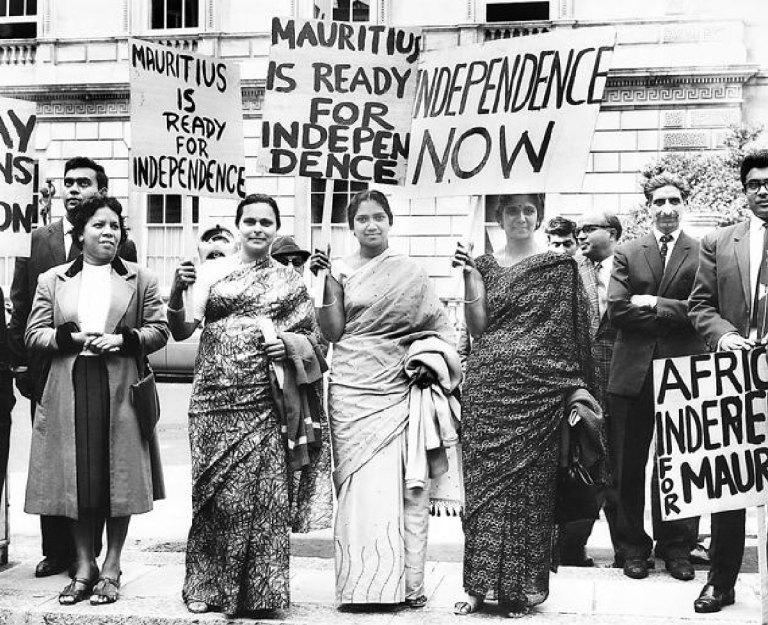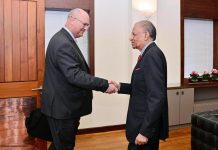Africa-Press – Mauritius. As a supplement to the introductory note on the Mauritius Labour party’s memorandum addressed to the Secretary of State for the Colonies for discussions in the context of the Constitutional Conference of 1965, we provide more details in this second and final part.
The points taken up in this second part reinforce our claim that our Constitution is an evolutionary one; some of the Labour Party proposals had already been implemented in the 1964 Constitution, but the party wanted them incorporated in the Independence Constitution as well.
For example, the first 16 sections of the 1964 constitution ‘contain justiciable safeguards for the protection of fundamental rights and freedoms of the individual.
It also allowed for an ‘unofficial Member of the Council of Ministers to be appointed Attorney General, and the Director of Public Prosecutions be given exclusive and independent authority in relation to the taking over, continuance and discontinuance of criminal proceedings’.
Furthermore, the Constitution made provision for a Public Service Commission, a Police Service Commission and a new Judicial and Legal Service Commission.
In fact, in the report of the Constitutional Commissioner Professor S. A de Smith, submitted in November 1964, the major constitutional issues which allowed the various parties to consider and make proposals were examined.
For example, at the Constitutional Conference of 1961, the IFB had asked for a high-powered tribunal to investigate abuses of authority in the country.
What was proposed instead by the Colonial Office was for the leader of the IFB and the President of the Labour Party to visit Sweden to learn about the operation of the institution of the Ombudsman there.
Finally, it was the New Zealand’s model which was proposed for Mauritius. Mauritanians rallying for independence in London in the 1960s 12. The Ministers
The Cabinet shall consist of not more than fifteen Ministers to be appointed by the Governor-General on the advice of the Prime Minister from among the elected members of the National Assembly.
The Prime Minster and other Ministers should vacate office on ceasing to be members of the National Assembly, except upon a dissolution, when they would remain in office until a Prime Minister is appointed or reappointed after the general election.
13. Leader of the Opposition
The right of organised political opposition should be recognised in the constitution (in addition to any reference in the Bill of Rights) by reference to the office of the leader of the Opposition.
He should be appointed by the Governor-General under guidance provided in the Constitution to secure the selection of the elected member commanding the confidence of the largest number of opposition members in the Assembly.
14.
The Constitution should require the Prime Minister to consult the Leader of the Opposition on certain stated decisions of national importance, namely the appointment of the members of the Service Commissions and the Electoral Commission.
In the event of the Governor-General failing to reconcile a difference, the recommendation of the Premier should prevail. The Constitution should be framed if possible so as to encourage the establishment of a convention that the Leader of the opposition is consulted on important questions of national policy which transcend party positions.
It is not thought practicable to define or list such matters. 15. Financial Procedure The Labour Party is in favour of the Constitution making provision for the Consolidated Fund, the control of Parliament over annual expenditure, the borrowing of money and the creation of charges on and the authorisation of withdrawals from the Consolidated Fund, and for the function and independence of a Controller and Auditor-General.
16. Safeguards against abuse of powers
The Labour Party strongly supports the inclusion of the following safeguards in the Constitution and is willing to examine objectively any other proposed safeguards, provided that they are not calculated to impede the development of a national spirit or hamper the Government in protecting and fostering the interests of the nation as a whole:
(1) A chapter of fundamental human rights, with adequate provision for their enforcement by the Courts and including the prerogative writs or equivalent remedies.
These provisions should include comprehensive provision for the preservation of religious freedoms, for the prohibition of racial or other discrimination in the law or in its administration, for the preservation of free trade unions as an aspect of freedom of association and for freedoms in the provision of education.
(2) Provision of an Ombudsman on the lines suggested by Professor De Smith.
The responsibilities of this officer require detailed consideration, but no obstacle of principle to the implementation of this proposal is anticipated.
(3) A chapter on the Judiciary for the unlimited jurisdiction of the superior courts, the rights of appeal, the appointment of the judges of the superior and subordinate courts by the Judicial Service Commission, and their security of tenure of office. The chief Justice should be appointed by the Governor-General on the advice of the prime Minister, as in other commonwealth countries.
(4) The Judicial Service Commission, the Public Service Commission and the Police Service commission (if that Commission is not merged in the Public Service Commission) should be executive, that is to say should appoint, discipline and remove all officers within their jurisdiction.
Certain of the highest posts in the public sector, such as Permanent Secretaries and Heads of Department, should be appointed by the Governor-General acting on the advice of the Public Service Commission, which should consult the Prime Minister but should be removable only by the public Service Commission.
Up to a certain level appointments and removals in the Police force should be in the power of the Commissioner of police. The method of and qualifications of appointment to the service Commissions should be designed to secure their independence from party political or communal bias.
the members of the Service Commissions should enjoy a security of tenure of office similar to that of the judiciary (5) The periodical review of constituencies and the supervision of elections should be the functions of an independent Electoral Commission.
The method and qualifications for appointment of the members of the Commission should be designed to secure absence of bias. The members of the Commission should be protected from removal of office.
(6) A Bill for the amendment of the Constitution should require the support of two thirds of all the members of the National Assembly on the second and third readings.
The degree of entrenchment is common in Commonwealth countries, and in the context of Mauritius is considered ample to safeguard the constitution. 17.
Whatever may be decided upon for Mauritius at the Conference, the matter on which the Mauritius Labour Party and the overwhelming majority of Mauritians feel more strongly than any other is that the goal must be reached at the earliest possible date.
It is the unalterable conviction of the Labour Party that nothing is to be gained, and much is to be lost, by delay. Mauritius has no lack of talent or aptitude for government.
The heterogeneity of the population is today no obstacle to Independence, since it is reflected in the leadership and support of the principal political party, in the public service and in all fields of public life. Indeed, delay will only encourage further appeals to communal fears and prejudices.
The important and indisputable fact is that since 1961 the constitutional practice in Mauritius has been in all significant respects precisely what it would have been if the fullest measure of internal self-government had been granted in that year.
The people of Mauritius feel strongly that no more time can be wasted on the playing of further variations on the theme of internal self- government as a prelude to independence. Port Louis, Mauritius 14th August 1965







